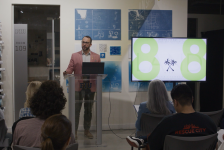ASLA and CLARB have aggregated data on all states and provinces regarding education and experience requirements needed in order to sit for the LARE. The North American map provided by CLARB, shows the information for the states or provinces you are considering getting licensed in. (Note to CLARB: Please add state and province labels to your map like we talked about on the phone today.)
For those of us who live and work in one state and have no plans to relocate, we generally seek licensure in that state, although District of Columbia practitioners must still seek licensure in a neighboring state, until DC completes its licensure rule-making process.
ASLA has advised candidates to sit for the LARE as soon as possible, register for the exam in a state with fewer work experience requirements if their experience falls short of their home state requirements, then apply for home state reciprocity after they get their initial license. Before you do this, there are some important considerations that will impact your candidacy about which you should be aware.
TIME’S UP
In this case, “Time’s Up” refers to the requirement by certain state licensing boards to successfully complete all four LARE sections within a certain number of years. If you are unsuccessful, these states will throw out your passing scores and make you start the process all over again. When asked, I was told that neither CLARB nor ASLA intend to aggregate this data, saying that it is difficult to obtain from the states and that it is subject to change. They say that candidates should check themselves.
If you may relocate during or after your licensure process, it’s important to know if a state’s time out policy could affect you. Sometimes our LARE process is delayed while we care for an aging parent, have children of our own, lose our jobs, or struggle with one or more exam sections. I have met one determined candidate who persevered through a number of exam failures over the years, only to have all that time, effort, and money discounted when her state’s clock ran out.
A cursory search for this post revealed a partial list of such states. If you know of other examples, please email me so that I may share that information.
Texas: You have five years to complete all LARE sections.
Washington State: You have five years to complete all LARE sections.
Massachusetts: You have three years to complete all LARE sections. [The Massachusetts licensing board just phoned to say that it is five years.]
MINOR ADDITIONAL QUALIFICATIONS
Massachusetts is the only American state that does not recognize CLARB’s council record system. All applications must go through that state’s licensing board. There is an eight question quiz on the Massachusetts licensure application that you must answer, having mostly to do with state laws.
Iowa has an electronic portfolio document requirement, which asks for documentation of five projects in pdf form along with the state’s initial licensure application. This requirement is only visible on the actual application, which is only visible to applicants, but not the general public.
These are just two anomalous examples, but there may be others if you thoroughly search any state licensing board’s website.
SUPPLEMENTAL EXAMS
After passing the LARE, some states require that you also pass a state supplemental exam. Sometimes these exams focus on state laws and regulations. State climate and soil conditions, invasive plants, and other items may also be included in these supplemental exams. CLARB said in a phone conversation today that they intend to aggregate the information on which states require a supplemental exam sometime next year. Meanwhile, here is a partial list of some states and provinces that require supplemental exams:
British Columbia requires an in-person oral exam and interview.
California has a supplemental exam.
Florida has a laws and rules exam.
Rhode Island has a state supplemental exam.
FEES
Most states charge minimal amounts (under $100/year) for your actual license once you’ve fulfilled all other requirements. That’s the good news after this lengthy and costly process. However, some states have additional requirement which have associated fees. One example is Texas, which requires a criminal background check and a complete set of fingerprints. Some state annual licensing fees are higher than the norm. One example is Washington State.
CONTINUING EDUCATION REQUIREMENTS
Florida is notorious for its rigorous continuing education requirements, but other states vary on this point. Check the states you are considering for their content and reporting requirements.
—
Cheryl Corson, RLA, ASLA, leads online and interactive LARE prep sessions during every exam cycle through Corson Learning.










Smithhart
If you are testing in a state with a supplemental exam. Can you apply for licensure (Initial or Reciprocity) in another state after you pass the LARE and before you pass the supplemental exam in the state you originally applied for?
Cheryl Corson
If you have applied in, say, California for initial licensure, you must see the process through in that state. When you complete your exams, have CLARB forward your results to the state licensing board. But then you need to pass the supplemental in order to get your initial license. That’s my understanding. Always check with the state licensing board you have applied to to verify. Good luck!
J. Robert (Bob) Wainner
A very well written article, Cheryl. Thank You.
Yes, over the years, various States have added “supplemental” exams. It’s my understanding that maybe the most difficult “State Exam” is the Florida Exam. I was once a “licensed LA” in the State of Florida for 10 consecutive years. I allowed my license to lapse. 8 years later, I learned that I would have to take the Florida Exam in order to get my Florida LA license reinstated…I had (28) years of LA exp. at the time (and had been licensed in 13 other States)…and was currently a “licensed LA in The State of Texas…27 yrs.). I also had a minimum of 9 years of experience practicing in The State of Florida. I stood before the Florida LA Board and asked them to reinstate me…I felt that I was “competent” to practice and that I should be exempt from the Exam. In looking at that Florida Board, I felt I had substantially more LA experience than all of them…..but, they denied my request.
So, my advise to anyone who has an LA license in ANY State….be sure you keep your annual fees paid up to date AND be sure you take the required “Continuing Education Courses”….and keep careful records of those “Continuing ED courses”….as many States will ask you to prove you took the req’d courses. If you have an LA license in a State where a “State supplemental Test” is required…..I’d highly recommend you hang on to that State license.
J. Robert (Bob) Wainner